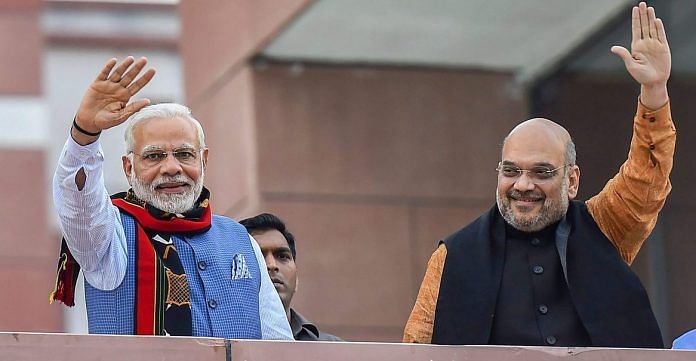Exploring the nexus between corporate houses and the Indian government during hate attacks.
The CEOs of American corporations explicitly showed their opposition at the first instance of the state’s endorsement of White supremacy. Indian corporate leaders, on the other hand, have chosen to ignore the divisive politics of the ruling establishment in spite of repeated lynchings. This silence requires an explanation.
One reason for the corporate support or accommodation of Hindutva could be the BJP’s commitment to neoliberalism, the belief in the organisation of societies on market principles.
Since corporate support for pro-market ideologies is not unusual, the support by businesses and large sections of the middle classes to the BJP could be merely instrumental, motivated by profits. This reasoning is best exemplified by a representative philosopher of corporate India who dismisses lynchings as a ‘sectarian incident’ and asserts that ‘job creation was as great a moral imperative as secularism’. The business sector and the media (which is increasingly controlled by large corporations) benefit not just from the neoliberal policies of the BJP, but also from its Hindu nationalist rhetoric. A recent study shows how an Indian company was able to use Hindutva to its advantage when its partnership with a multinational company went off the rails.
A more charitable and less dark explanation for the muteness could be fear of reprisals by the state. American democratic institutions are more entrenched and their values more ingrained in the citizens. The US’s robust institutions can protect American CEOs from the autocratic impulses of any leadership. In comparison, India is still a work-in-progress, with its institutions often deployed to serve political ends. The current dispensation’s proclivity to use investigating agencies to selectively harass opponents of its political agenda could be keeping corporate India under leash. The contemporary cronycapitalist-Gilded Age excesses of companies are continuing to fill corporate closets with skeletons. The increasing digitisation of financial information without the requisite safeguards and the persistence of a Kafkaesque bureaucracy means that skeletons can even be conjured up by the state to target those who step out of line.
A further explanation for this contrasting response can be found in the reactionary tendencies of the seemingly modern business elites and the upwardly mobile classes in India. ‘Reactionary modernism’ is a term coined by Jeffrey Herf to describe the intellectual background of early twentieth-century Germany, characterised by a significant section of the society, including scientists, philosophers and the technologically advanced corporate sector contributing to, and benefiting from, their alignment with a divisive political agenda. It described the paradoxical rejection of one aspect of modernism—rationality—while appropriating the technological advances made possible by rational thought. Meera Nanda notes the emergence of a ‘state–temple–corporate complex’ wherein corporate interests merge seamlessly with religious and political interests as an outcome of reactionary modernism. The following paragraphs give a brief overview.
One of the key predictions of theories of modernisation was that education and wealth would lead to rejection of religiosity. However, as Nanda observes, material progress has not led to the reduction in religiosity in India or elsewhere. Neoliberal reforms in the later decades of the twentieth century created a wealthy, educated, technologically savvy and influential pro-market section in India. Wealth and education have created an urban middle-class that is increasingly belligerent in its religiosity. Minor rituals in Hindu temples have become more ostentatious and new rituals have been formulated. Illiberal aspects of Indian culture such as caste systems, patriarchy, ritualism and other superstitions have now become mainstream.
The political power of Hindu nationalism spearheaded by the BJP and expressed through lynchings is derived from the paradoxical combination of tradition and modernity. The bulk of the BJP’s support base is drawn from the same socially privileged urban middle-class that finds Hindu nationalism and even authoritarianism appealing. The corporate sector continues to be dominated on all levels by the same groups. Public expressions of faith by corporate leaders through the funding of these rituals have given Hindu customs and worldviews a central position in the business world.
In India, as opposed to advanced societies where freemarket thinking and liberalism have gone hand in hand, economic interests are interlocked with interest in the maintenance of cultural hierarchies and the Hindu supremacies that the lynchings claim to defend. Given the influence of religion on perspectives, it is not surprising that corporate social responsibility (CSR) funds are now being spent on cow-protection initiatives, providing further legitimacy to cow vigilantism. A fairly accurate embodiment of reactionary modernism are the religious gurus who champion Hindu supremacy and, at the same time, engage in the manufacture and selling of consumer goods without being accused of duplicity. This fusing of neoliberalism and Hindu assertion is what makes reactionary modernism a plausible explanation for the silence of the corporates in the face of lynchings.
Nevertheless, it is time for Indian corporate leaders and professionals to respond. Minorities in India are, to borrow Martin Luther King’s words, living ‘constantly at tiptoe stance’ (1963), confined to a life of permanent fear, devoid of any hope of protection from vigilantes or justice from the state. A society composed of groups that derive pleasure from terrorising and humiliating those they deem inferior is untenable and bound to implode. So, it would appear that this is possibly the right time for Indian corporations to rediscover their moral conscience and not allow their actions, including their silence, to be interpreted as endorsements of violence. This means acknowledging that corporate profits and salaries gained through the ‘ease of doing business’ schemes of the 103 current government are stained by the blood of the lynch mobs’ victims.
 This is an excerpt from the book “Reconciliation” which has been edited by Harsh Mander, Natasha Badhwar and John Dayal. It was published in 2018 by Context, an imprint of Westland Publications Private Limited.
This is an excerpt from the book “Reconciliation” which has been edited by Harsh Mander, Natasha Badhwar and John Dayal. It was published in 2018 by Context, an imprint of Westland Publications Private Limited.



